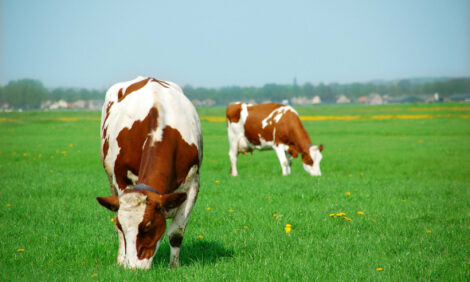



NDSU: Protect Against Anthrax Now
US - As the season turns and Anthrax infection becomes prevalent, the North Dakota State University has decided to take an early opportunity to say: 'now is the time to vaccinate livestock against anthrax'.“In North Dakota, three things in life are certain: death, taxes and anthrax,” says North Dakota State University Extension Service veterinarian Charlie Stoltenow. “Producers should contact their veterinarian about getting their livestock vaccinated before turning the animals out for spring and summer grazing.”
Anthrax usually is a fatal disease in cattle or sheep, although it can affect all warm-blooded species, including humans. Animals generally develop the disease after grazing on infected pastureland.
It worries producers because spores of the bacteria that cause the disease can survive in the soil for many decades. Favorable conditions, such as heavy rainfall, flooding or drought, may lead to outbreaks. Rain and flooding can raise the spores to the ground’s surface, where livestock graze. Drought conditions can lead to soil erosion, which also allows spores to resurface.
Cases of anthrax develop in the region almost every year. The first case in the U.S. this year was confirmed March 31 in a goat near Del Rio, Texas.
North Dakota had one confirmed case in 2007, compared with five in 2006 and more than 500 in 2005.
“We do not want a repeat of 2005,” Stoltenow says. “After the outbreak in 2005, we launched a widespread vaccination campaign and the results of those efforts were a dramatic decline in cases in 2006 and 2007.
”The anthrax vaccination is very effective and safe,” he adds.
He also advises producers to pay attention to their flocks and herds because livestock can die from anthrax extremely quickly without noticeable symptoms.
Producers who suspect a case of anthrax should not move the carcass or open it. Instead, they should have a veterinarian check any unexplained, sudden animal deaths. North Dakota veterinarians are trained in the correct methods of sampling a carcass for anthrax to prevent exposure to themselves or others. Even though cases of people contracting anthrax from carcasses are extremely rare, it is a deadly pathogen.
Further Reading
| - | Find out more about Anthrax by clicking here. |


